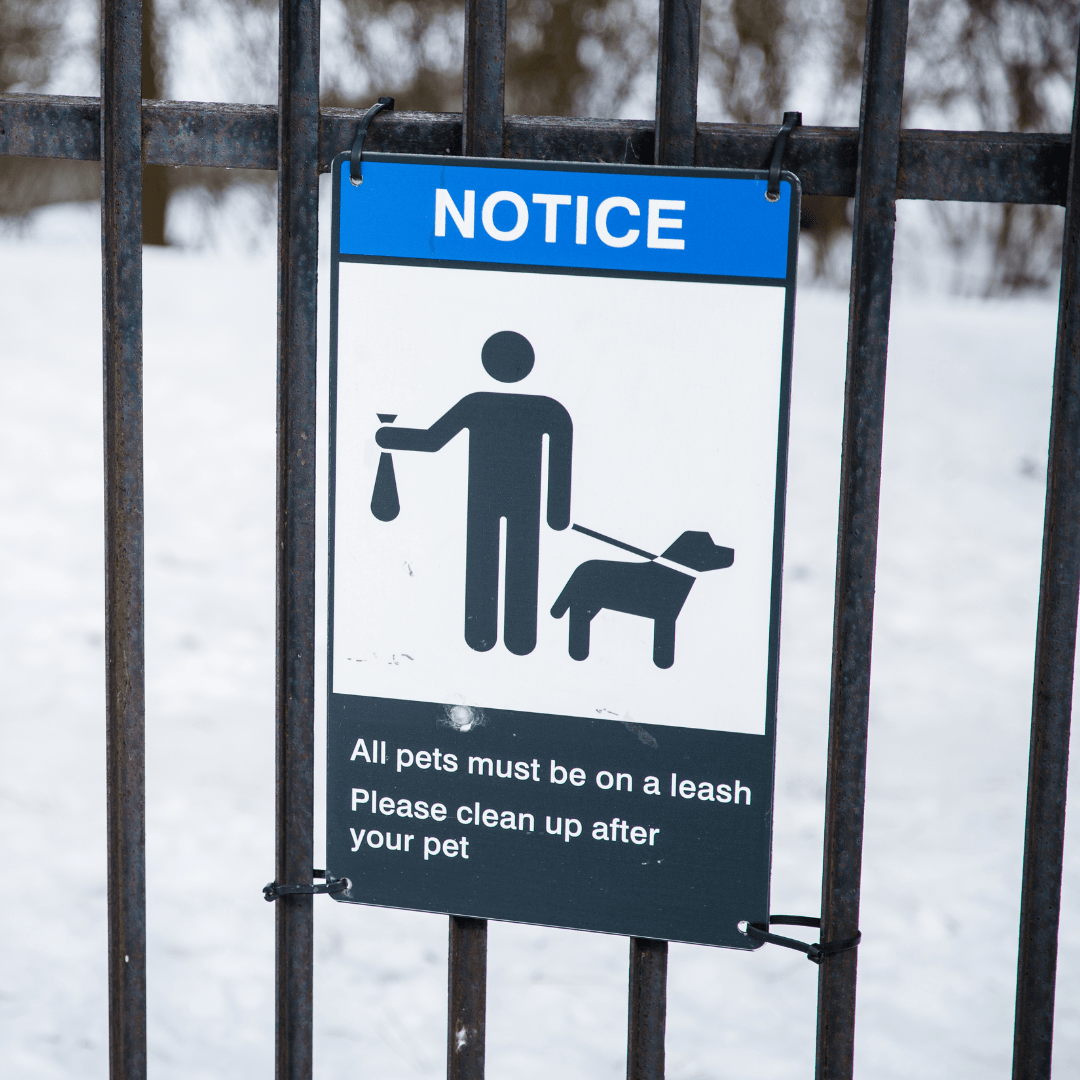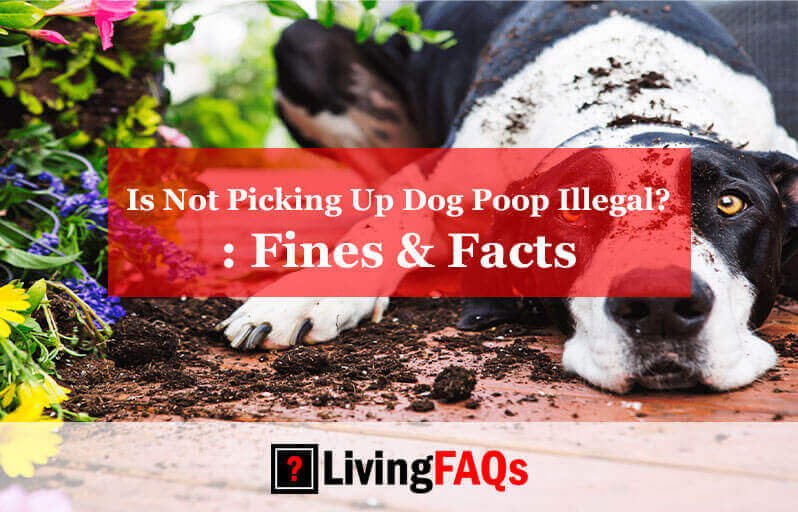Yes, not picking up dog poop is generally illegal and can result in fines. Local ordinances often require pet owners to clean up after their pets.
Dog owners everywhere know the drill: your furry friend does their business, and it’s your responsibility to scoop it up. Failing to do so isn’t just frowned upon; it’s against the law in many cities and neighborhoods. The reasons are clear – not only does dog waste contribute to pollution, but it poses health risks to both humans and other animals.
Responsible pet ownership includes maintaining cleanliness in public spaces, which is why so many communities enforce these rules with fines and penalties. By ensuring you pick up after your dog, you’re contributing to a cleaner, safer environment and adhering to local laws designed to keep public areas pleasant for everyone. Keep a stash of bags handy on every walk to avoid getting caught unprepared and potentially facing consequences.

Credit: www.reddit.com
The Legalities Of Dog Waste Disposal
Picking up dog poop is not just a courtesy, it’s a legal matter. Dog owners must know local and state regulations to avoid fines. Unpicked waste poses health risks and environmental concerns. Compliance helps keep communities clean and safe.
Local Ordinances On Dog Fouling
Cities and towns have specific rules for dog waste removal. Ordinances may vary, but fines are common. Owners must carry bags and dispose of waste properly. Some areas have “pooper scooper” laws in place. These laws make sure sidewalks and parks stay clean.
- Carry bags during walks
- Dispose of waste in trash bins
- Follow signs in public areas
State Laws On Pet Waste
State laws often reinforce local ordinances. They can impose larger fines. Some states require pet waste management in apartment complexes. Others focus on water quality, preventing waste from entering waterways. Penalties can include community service or education programs.
| State | Law Summary | Penalties |
|---|---|---|
| New York | Must clean up in public spaces | Fines up to $250 |
| California | Prevent waste from polluting water | Fines or community service |
| Florida | Apartment waste management rules | Educational programs |
Health And Environmental Concerns
Health and Environmental Concerns are big issues with dog poop. Not picking it up can cause problems. Let’s learn about these concerns.
Dog Waste As A Public Health Issue
Dog poop is not just gross. It’s a health risk. It can carry harmful bugs. These bugs can make people sick. Always clean up after your dog to keep everyone safe.
- E. coli: A bug that can cause stomach problems.
- Salmonella: A bug that can make you feel very sick.
- Parasites: Tiny creatures that can live in poop.
Environmental Impact Of Dog Poop
Dog poop can hurt our planet. It gets into water and soil. This is bad for animals and plants. Here are ways dog poop can harm the environment:
| Problem | Effect |
|---|---|
| Water Pollution | Poop gets into rivers and lakes. It makes water dirty. |
| Soil Pollution | Poop breaks down and hurts the soil. Plants can’t grow well. |
| Health of Wildlife | Animals can get sick from poop. It’s dangerous for them. |
Remember, always pick up after your dog. It keeps us and Earth safe.
Fines And Penalties For Non-compliance
Fines and penalties act as deterrents for leaving dog waste.
Many municipalities enforce strict rules to ensure clean public spaces.
Typical Fines For Leaving Dog Waste
Dog owners can face substantial fines for not picking up after their pets.
- Fines vary by location, usually starting from $50.
- In some areas, fines can increase up to $1000 for repeat offenders.
- Additional fees may apply for environmental cleanup.
Enforcement Of Poop Scooping Laws
Enforcement ensures dog owners comply with local laws.
Park rangers, animal control, and police may issue fines.
Some communities use surveillance and reporting systems.
Public awareness campaigns educate on the importance of compliance.

Credit: nypost.com
The Social Etiquette Of Dog Ownership
Being a dog owner comes with joys and responsibilities. One key aspect is understanding and adhering to the unwritten rules of social etiquette that come with walking your furry friend in public spaces. It’s not just about leash laws; it’s about respect for the community and the environment. Let’s explore what is expected from responsible dog owners.
Expectations In Public Spaces
When you’re out with your dog, certain behaviors are expected of you. Cities have laws, but there’s also an unspoken code of conduct. Here’s what you need to know:
- Pick up after your pet: Leaving dog waste is not only rude but can be illegal.
- Leash your dog: Most areas require dogs to be on a leash for everyone’s safety.
- Control barking: Keep noise to a minimum to respect others’ peace.
Community Pressure And Courtesy
Ignoring the etiquette can lead to community pressure. Neighbors and fellow park-goers expect courteous behavior. Here’s how to show you care:
- Be proactive: Always have bags on hand to pick up waste.
- Be considerate: Understand that not everyone loves dogs.
- Be mindful: Keep your dog off private property and gardens.
Biodegradable Bags And Eco-friendly Disposal
Biodegradable Bags and Eco-Friendly Disposal play a crucial role in handling dog poop. Not picking up dog poop is not only rude but often illegal. Cities around the world fine pet owners who neglect this duty. Using biodegradable bags is a step towards responsible pet ownership and environmental protection.
Pros And Cons Of Biodegradable Options
| Pros | Cons |
|---|---|
|
|
How To Properly Dispose Of Dog Waste
- Pick it up immediately using a biodegradable bag.
- Tie the bag securely to trap the odor.
- Dispose of it in a trash can or dog waste bin.
- Never leave it on the ground or in nature.
- Wash your hands after disposal.
Choosing biodegradable bags and following these steps makes a difference. It keeps our parks and streets clean. It also protects our planet. Always remember, picking up after your dog is part of being a responsible pet owner.
Public Facilities For Dog Waste Disposal
Public Facilities for Dog Waste Disposal are essential in keeping our parks and sidewalks clean. Not picking up after your dog is not only rude but often illegal. Communities provide solutions to help dog owners comply with these laws.
Availability Of Dog Waste Stations
Dog waste stations are a common sight in many public areas. These stations make it easier for pet owners to do the right thing. They often include bags and a trash can for disposal. This convenience encourages dog walkers to pick up waste immediately.
- Found in parks
- Along walking trails
- Near beaches
- In many neighborhoods
Municipal Initiatives For Cleanliness
Municipalities take the lead in maintaining cleanliness. They install waste stations and promote awareness about the importance of picking up dog poop. Many cities also enforce fines for non-compliance. This keeps our environment clean and safe for everyone.
| Initiative | Objective | Outcome |
|---|---|---|
| Waste Station Installation | Provide disposal options | Cleaner public spaces |
| Campaigns and Signage | Educate pet owners | Increased awareness |
| Fine Enforcement | Deter non-compliance | Reduced waste issues |
The Role Of Dog Parks In Waste Management
Dog parks play a vital role in waste management. These designated areas for canines provide a space where dogs can play and socialize. They also offer a controlled environment to manage pet waste. Not picking up dog poop in these areas can lead to fines, as it is often illegal and harmful to the environment.
Amenities And Rules At Dog Parks
Dog parks are equipped with amenities for pet waste disposal. These may include:
- Waste stations with bags and trash cans
- Signage reminding owners to pick up after their pets
- Fenced areas to contain pets and waste
Park rules usually mandate pet owners to:
- Clean up after their dogs
- Dispose of waste properly
- Keep dogs on leashes where required
Maintaining Cleanliness In Off-leash Areas
In off-leash areas, maintaining cleanliness is crucial. Owners must:
- Be vigilant and pick up waste
- Use provided bags and bins
- Report full trash containers to park staff
This helps keep parks clean and safe for everyone.
Educating Dog Owners On Responsible Pet Care
A key part of owning a pet is understanding and fulfilling one’s duties to the community. Dog owners have a legal and moral responsibility to manage their pets properly. This includes dealing with waste in a lawful manner. Many areas have strict regulations regarding the cleanup of dog poop, and failing to comply can lead to fines or other penalties. It’s essential for pet owners to stay informed on how to care for their pets responsibly.
Community Programs And Workshops
Community initiatives play a vital role in educating pet owners. Local workshops and programs offer guidance and resources. They help ensure all dog owners know the rules and the reasons behind them.
- Free Supplies: Many programs provide bags and disposal bins.
- Expert Advice: Trainers and vets often give talks on pet care.
- Peer Support: Meet fellow dog owners and share tips.
The Importance Of Awareness And Training
Awareness campaigns and proper training can lead to better pet care habits. Responsible ownership is critical for a clean and safe community.
- Training helps dogs learn where to go.
- Owners understand the impact of negligence.
- Community health and cleanliness improve.

Credit: www.getsetpet.com
Frequently Asked Questions
Is Leaving Dog Poop Illegal?
Yes, not picking up dog poop is generally illegal. Many local ordinances require pet owners to clean up after their pets in public spaces.
What Are The Consequences For Not Scooping Poop?
Failing to pick up dog waste can lead to fines, community service, or other penalties depending on local regulations.
Why Is It Important To Pick Up Dog Waste?
Dog poop can carry harmful bacteria and parasites, polluting the environment and posing health risks to people and other animals.
Can You Get Fined For Dog Fouling?
Yes, fines for dog fouling are common in many municipalities, aiming to encourage responsible pet ownership and cleanliness.
Does Dog Poop Affect Local Waterways?
Dog waste can contaminate waterways with nutrients and pathogens, leading to water pollution and potential health hazards.
Conclusion
Navigating the rules around dog waste disposal is crucial for every pet owner. Neglecting to pick up after your dog isn’t just inconsiderate; it’s often against the law. By understanding and following local regulations, you contribute to a cleaner, healthier environment for everyone.
Remember, responsible pet ownership includes proper waste management. Let’s all do our part.

